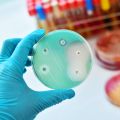
The Oxford students at the forefront of the fight against microbial resistance
Antimicrobial resistance (AMR) is one the most pressing challenges facing the world today. Common infections that were once easily treated by antibiotics are becoming life-threatening again. By 2050 it is predicted that over 10 million deaths will be caused by drug-resistant infections every year.
At the Ineos Oxford Institute for antimicrobial research (IOI), created in 2021 to advance antimicrobial research, Oxford’s graduate students are among those contributing to the search for solutions to tackle this growing threat to global health.
34 DPhil students from around the world are based at the IOI, each part of a focused research project that works to develop new antibiotics or study the spread and impact of AMR around the world.

Working closely with two research assistants in the hospital – Maryam and Firdausi – Kate acts as a microbiological detective, identifying which kinds of bacteria are causing infections in patients, then investigating whether these bacteria are also present on hospital surfaces, and in insects caught on the wards.
“Designing creative experiments is the best part of my work. It can be challenging when there are huge numbers of samples to analyse, and trying to figure out how the bacterial transmission networks fit together, but the project is very rewarding. The opportunity to work with the team in Kano, who are equally as passionate about the project has been amazing.”

A microbiologist by training, Shonnette analyses fly samples which will be collected from countries across the globe.
“The flies are sent to our lab in Oxford after they have been collected and labelled in hospitals. They arrive whole, so our first step is to homogenise them, which basically means we make fly juice. The next step is to prepare bacterial cultures, and then extract and sequence their DNA. We’re looking for antimicrobial resistance genes that we know are related to multidrug-resistant infections.”

The work is potentially life-saving – antibiotic resistance to sepsis is a leading cause of deaths in newborns, with 99% of global newborn mortality occurring in low-and-middle income countries.
“I am drawn to research that directly benefits people, and the work that the BARNARDS team were doing really resonated with me - not just scientific enquiry but helping the community itself by translating research into better clinical outcomes.”
Wojtek Treyde, a PhD student who has previously studied at the University of Heidelberg in Germany is part of the INEOS Oxbridge Doctoral Initiative on Antimicrobial Resistance – a fully funded DPhil programme that enables up to seven candidates to study at both the universities of Oxford and Cambridge.
Wojtek is a computational chemist working on drug development. His PhD project combines his research experience so far – an undergraduate degree in chemistry and master’s degree with a focus in Machine Learning.
A branch of chemistry, computational chemistry uses computer simulations to solve complex chemical challenges, such as the discovery of new antibiotics to tackle rising rates of AMR. Wojtek works closely with lab-based researchers at the IOI to use machine learning to inform research.
“I wanted to use my training in an area where I could make a difference. Alongside climate change, AMR is the biggest threat facing humanity and I want to contribute to finding new solutions.”

 Africa’s change-makers: meet the Mastercard Foundation Scholars with big ambitions for the future
Africa’s change-makers: meet the Mastercard Foundation Scholars with big ambitions for the future A green fuels breakthrough: bio-engineering bacteria to become ‘hydrogen nanoreactors’
A green fuels breakthrough: bio-engineering bacteria to become ‘hydrogen nanoreactors’ Oxford's student voices at COP29
Oxford's student voices at COP29 Teaching the World’s Future Leaders
Teaching the World’s Future Leaders  A blueprint for sustainability: Building new circular battery economies to power the future
A blueprint for sustainability: Building new circular battery economies to power the future Oxford citizen science project helps improve detection of antibiotic resistance
Oxford citizen science project helps improve detection of antibiotic resistance The Oxford students at the forefront of the fight against microbial resistance
The Oxford students at the forefront of the fight against microbial resistance  The hidden cost of AI: In conversation with Professor Mark Graham
The hidden cost of AI: In conversation with Professor Mark Graham  Astrophoria Foundation Year: Dr Jo Begbie reflects on the programme’s first year
Astrophoria Foundation Year: Dr Jo Begbie reflects on the programme’s first year